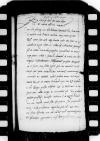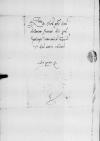 BCz, 1599, p. 811
BCz, 1599, p. 811
Reverendissime in Christo Pater, Domine, domine amice observandissime.
Salutem plurimam et amica officia commendata.
Cum alia pleraque cum domino Stanisław Kostka (*1487 – †1555), as a leader of the so-called nobles' party active in Royal Prussia since 1536, Kostka stood in opposition to most of the members of the Council of Royal Prussia, who wanted to maintain the autonomy of the province and a "balance of power" in terms of governance. The tension between the Prussian Subtreasurer and the Council had been increasing since the Diet in Graudenz (Grudziądz) in 1533. Kostka, connected with the royal court since his youth, was sent to Graudenz as the King's deputy and, contrary to custom, decided to take part in the proceedings. In response to such a step, the Council members stopped the meeting. Kostka accused them of hostility towards the Poles and intervened on this matter at the court. In the absence of the then Bishop of Ermland (Mauritius Ferber) it was Dantiscus who chaired the Graudenz Diet. The incident badly harmed his future relationships with Kostka; 1531-1555 Treasurer of the Prussian lands and Treasurer of Marienburg (Malbork); 1544-1545 Castellan of Elbing (Elbląg), 1545-1546 Castellan of Kulm (Chełmno); 1546-1549 Vice-Voivode of Kulm; 1546-1551 Voivode of Pomerania; 1551-1555 Voivode of Kulm (PSB 14, p. 356; Urzędnicy 5/2, p. 216; MAŁŁEK 1976, p. 119-123)⌊palatino PomeraniaeStanisław Kostka (*1487 – †1555), as a leader of the so-called nobles' party active in Royal Prussia since 1536, Kostka stood in opposition to most of the members of the Council of Royal Prussia, who wanted to maintain the autonomy of the province and a "balance of power" in terms of governance. The tension between the Prussian Subtreasurer and the Council had been increasing since the Diet in Graudenz (Grudziądz) in 1533. Kostka, connected with the royal court since his youth, was sent to Graudenz as the King's deputy and, contrary to custom, decided to take part in the proceedings. In response to such a step, the Council members stopped the meeting. Kostka accused them of hostility towards the Poles and intervened on this matter at the court. In the absence of the then Bishop of Ermland (Mauritius Ferber) it was Dantiscus who chaired the Graudenz Diet. The incident badly harmed his future relationships with Kostka; 1531-1555 Treasurer of the Prussian lands and Treasurer of Marienburg (Malbork); 1544-1545 Castellan of Elbing (Elbląg), 1545-1546 Castellan of Kulm (Chełmno); 1546-1549 Vice-Voivode of Kulm; 1546-1551 Voivode of Pomerania; 1551-1555 Voivode of Kulm (PSB 14, p. 356; Urzędnicy 5/2, p. 216; MAŁŁEK 1976, p. 119-123)⌋ hic, tum vero de unitate Royal Prussia (Prussia Regalis), region, part of Prussia annexed to the Kingdom of Poland in 1466 under the provisions of the Second Peace of Thorn⌊terrae PrussiaeRoyal Prussia (Prussia Regalis), region, part of Prussia annexed to the Kingdom of Poland in 1466 under the provisions of the Second Peace of Thorn⌋ multum diuque coram egimus, etsi enim satis iusta atque honesta ratio illa fuit, ut ne membrum Poland (Kingdom of Poland, Polonia)⌊RegniPoland (Kingdom of Poland, Polonia)⌋ alterum alterius calamitate pasceretur, sed ut omnia commoda perpetua aequabilitate in omnes Regni partes veluti e stomacho alimentum in omnia membra corporis diffunderentur, nihilominus praesens tempus, ut id fieret, non solum poscit, sed iam omnibus modis exigit, quo quam coniunctissime vivamus muniamurque concordia ac unitate, veluti quodam muro adversus omnem vim et ea moenia The Ottoman Turks (Turcae) ⌊TurcarumThe Ottoman Turks (Turcae) ⌋, quae iam et in Poland (Kingdom of Poland, Polonia)⌊fundoPoland (Kingdom of Poland, Polonia)⌋ serenissimi nostri Sigismund I Jagiellon (Zygmunt I) (*1467 – †1548), King of Poland and Grand Duke of Lithuania (1506-1548); Duke of Głogów (Glogau) (1499-1506), Duke of Opava (1501-1506), Governor of Silesia (1504-1506); son of King Kazimierz IV Jagiellon and Elisabeth of Austria⌊principisSigismund I Jagiellon (Zygmunt I) (*1467 – †1548), King of Poland and Grand Duke of Lithuania (1506-1548); Duke of Głogów (Glogau) (1499-1506), Duke of Opava (1501-1506), Governor of Silesia (1504-1506); son of King Kazimierz IV Jagiellon and Elisabeth of Austria⌋ passim aedificat, et in Duchy of Moldavia (Valachia, Hospodarstwo Mołdawskie), country between the eastern Carpathians, the Dniester and the Danube delta, from 1456 a fiefdom of Turkey, where Polish and Turkish influences clashed in the 15th-16th centuries. The Latin name Valachia was widely used in Poland at the time to describe Moldavia, and not the Duchy of Wallachia, which was further south⌊MoldaviaDuchy of Moldavia (Valachia, Hospodarstwo Mołdawskie), country between the eastern Carpathians, the Dniester and the Danube delta, from 1456 a fiefdom of Turkey, where Polish and Turkish influences clashed in the 15th-16th centuries. The Latin name Valachia was widely used in Poland at the time to describe Moldavia, and not the Duchy of Wallachia, which was further south⌋, in Hungary (Kingdom of Hungary)⌊HungariaHungary (Kingdom of Hungary)⌋ vero multo magis vi consecutus est. Ex quibis quidem praesidiis (horresco referens) in Poland (Kingdom of Poland, Polonia)⌊Regnum PoloniaePoland (Kingdom of Poland, Polonia)⌋ non uno tractu, quod satis esse poterat, sed propemodum undique nullo prohibente ingruere poterint, et nos aut secum discordes, aut ab omnibus rebus imparatissimos et oscitantes opprimere (nisi Deus prohibuerit) poterit.
 BCz, 1599, p. 812
BCz, 1599, p. 812
Itaque quoad nobis libertas dicendi integra erit, nihil [...] hidden by binding⌈[...][...] hidden by binding⌉tatum relinquemus, ut Royal Prussia (Prussia Regalis), region, part of Prussia annexed to the Kingdom of Poland in 1466 under the provisions of the Second Peace of Thorn⌊PrussiaRoyal Prussia (Prussia Regalis), region, part of Prussia annexed to the Kingdom of Poland in 1466 under the provisions of the Second Peace of Thorn⌋ in nostro sen[...] hidden by binding⌈[...][...] hidden by binding⌉ suum etiam adfore (quod longe absit) periculum, nisi contra barbarorum molem, dum tempus patitur, [...] hidden by binding⌈[...][...] hidden by binding⌉ viribus quasi iunctis umbonibus consolidemur. Nam nihil fere residuum esse videmus, quod nos bene hidden by binding⌈[ene]ene hidden by binding⌉ sperare iubeat. Etenim Suleiman the Magnificent (*1494 – †1566), 1520-1566 Sultan of the Ottoman Empire⌊Turcarum imperatorSuleiman the Magnificent (*1494 – †1566), 1520-1566 Sultan of the Ottoman Empire⌋ (ut l[...] hidden by binding⌈[...][...] hidden by binding⌉ nuntiatum est) magna cum potentia in Hungary (Kingdom of Hungary)⌊HungariamHungary (Kingdom of Hungary)⌋ aut in Vienna (Wien, Vienna), city in eastern Austria, on the Danube river⌊ViennamVienna (Wien, Vienna), city in eastern Austria, on the Danube river⌋ tendit utrique, nisi Deus obstet, exterminium hidden by binding⌈[m]m hidden by binding⌉ allaturus, qui etenim illius potentiae se opponat, no[...] hidden by binding⌈[...][...] hidden by binding⌉mus principibus Christianis funestissimo ac civili bello hidden by binding⌈[lo]lo hidden by binding⌉ exhaustis ei tamen hucusque, ut aiunt, intentis. Ne vero a Prussia, a qua praesidium exspectamus, discrimen hidden by binding⌈[imen]imen hidden by binding⌉ nobis amplius impendeat, evicimus iam tandem, ut [...] hidden by binding⌈[...][...] hidden by binding⌉ta eius hinc proscriberetur, secundum quod Vestra Reverendissima Dominatio ex[...] hidden by binding⌈[...][...] hidden by binding⌉ domino Stanisław Kostka (*1487 – †1555), as a leader of the so-called nobles' party active in Royal Prussia since 1536, Kostka stood in opposition to most of the members of the Council of Royal Prussia, who wanted to maintain the autonomy of the province and a "balance of power" in terms of governance. The tension between the Prussian Subtreasurer and the Council had been increasing since the Diet in Graudenz (Grudziądz) in 1533. Kostka, connected with the royal court since his youth, was sent to Graudenz as the King's deputy and, contrary to custom, decided to take part in the proceedings. In response to such a step, the Council members stopped the meeting. Kostka accused them of hostility towards the Poles and intervened on this matter at the court. In the absence of the then Bishop of Ermland (Mauritius Ferber) it was Dantiscus who chaired the Graudenz Diet. The incident badly harmed his future relationships with Kostka; 1531-1555 Treasurer of the Prussian lands and Treasurer of Marienburg (Malbork); 1544-1545 Castellan of Elbing (Elbląg), 1545-1546 Castellan of Kulm (Chełmno); 1546-1549 Vice-Voivode of Kulm; 1546-1551 Voivode of Pomerania; 1551-1555 Voivode of Kulm (PSB 14, p. 356; Urzędnicy 5/2, p. 216; MAŁŁEK 1976, p. 119-123)⌊palatino PomeraniaeStanisław Kostka (*1487 – †1555), as a leader of the so-called nobles' party active in Royal Prussia since 1536, Kostka stood in opposition to most of the members of the Council of Royal Prussia, who wanted to maintain the autonomy of the province and a "balance of power" in terms of governance. The tension between the Prussian Subtreasurer and the Council had been increasing since the Diet in Graudenz (Grudziądz) in 1533. Kostka, connected with the royal court since his youth, was sent to Graudenz as the King's deputy and, contrary to custom, decided to take part in the proceedings. In response to such a step, the Council members stopped the meeting. Kostka accused them of hostility towards the Poles and intervened on this matter at the court. In the absence of the then Bishop of Ermland (Mauritius Ferber) it was Dantiscus who chaired the Graudenz Diet. The incident badly harmed his future relationships with Kostka; 1531-1555 Treasurer of the Prussian lands and Treasurer of Marienburg (Malbork); 1544-1545 Castellan of Elbing (Elbląg), 1545-1546 Castellan of Kulm (Chełmno); 1546-1549 Vice-Voivode of Kulm; 1546-1551 Voivode of Pomerania; 1551-1555 Voivode of Kulm (PSB 14, p. 356; Urzędnicy 5/2, p. 216; MAŁŁEK 1976, p. 119-123)⌋, tum ex litteris edictisque regiis cognoscet hidden by binding⌈[noscet]noscet hidden by binding⌉. Etsi autem non videamus posse id fieri, sine a[...] hidden by binding⌈[...][...] hidden by binding⌉omnium nostrum iactura, nihilominus praestat extempo[...] hidden by binding⌈[...][...] hidden by binding⌉  BCz, 1599, p. 813 nunc, quam aeternum olim, si neglexerimus, damnum perpeti cum singulari levipendio nominis nostri coniunctum.
BCz, 1599, p. 813 nunc, quam aeternum olim, si neglexerimus, damnum perpeti cum singulari levipendio nominis nostri coniunctum.
Quod restat, commendo me amori et favori Vestrae Reverendissimae Dominationis, quae ut me more suo redamet ac felix valeat cupio ab animo.
 BCz, 1599, p. 813 nunc, quam aeternum olim, si neglexerimus, damnum perpeti cum singulari levipendio nominis nostri coniunctum.
BCz, 1599, p. 813 nunc, quam aeternum olim, si neglexerimus, damnum perpeti cum singulari levipendio nominis nostri coniunctum.


